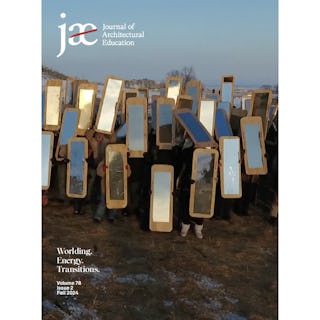JAE Vol. 78 Issue 2
journal of architectural education

WORLDING. ENERGY. TRANSITIONS.
"Across the planet, ecosystems and communities are threatened with perpetual wildfires, surging seas and coastal storms, and the radioactive dust and tailings of a new generation of industrial-scale mining that drives the energy transition at a planetary scale—among many other harrowing new realities. The planet is careening towards its worst global warming scenarios. How can this sense of urgency contribute to a radical world restructuring rather than another depoliticized project of green neoliberalism and individual corporate responsibility? How can designers build—in pedagogy, representation, and praxis—the world of climate justice?" These are a few provocations posed by JAE 78.2 theme editors Rania Ghson and Billy Fleming.
Climate change and the associated imperatives for decarbonization and energy transition are changing the stakes of urbanization. There is little doubt that the next quarter century will be one of the most decisive, disruptive, and possibly transformative times for human societies and our coexistence with planetary systems. This is a critical moment for the agency of design and its capacity to co-create these transformations. This is relevant for the material realities of the constructed environment as well as for its forms of representation-the unbuilt, experimental, and speculative imaging of future worlds. This project is focused on the latter. Climate transitions, and in particular just climate transitions, are less of a problem of technology, but moreover a problem of imagination; the imagination of socioenvironmental coexistences at both the intimate scale of individual relations and at the territorial and temporal scale and complexity of the crises that society faces. RVTR's contribution Drawing Transitions: Scroll Drawings Toward Intertwined Futures is a visual essay that positions the potential agency of scroll drawings as tools for thinking with, in the visioning and speculative prototyping for the transition toward alternative futures.